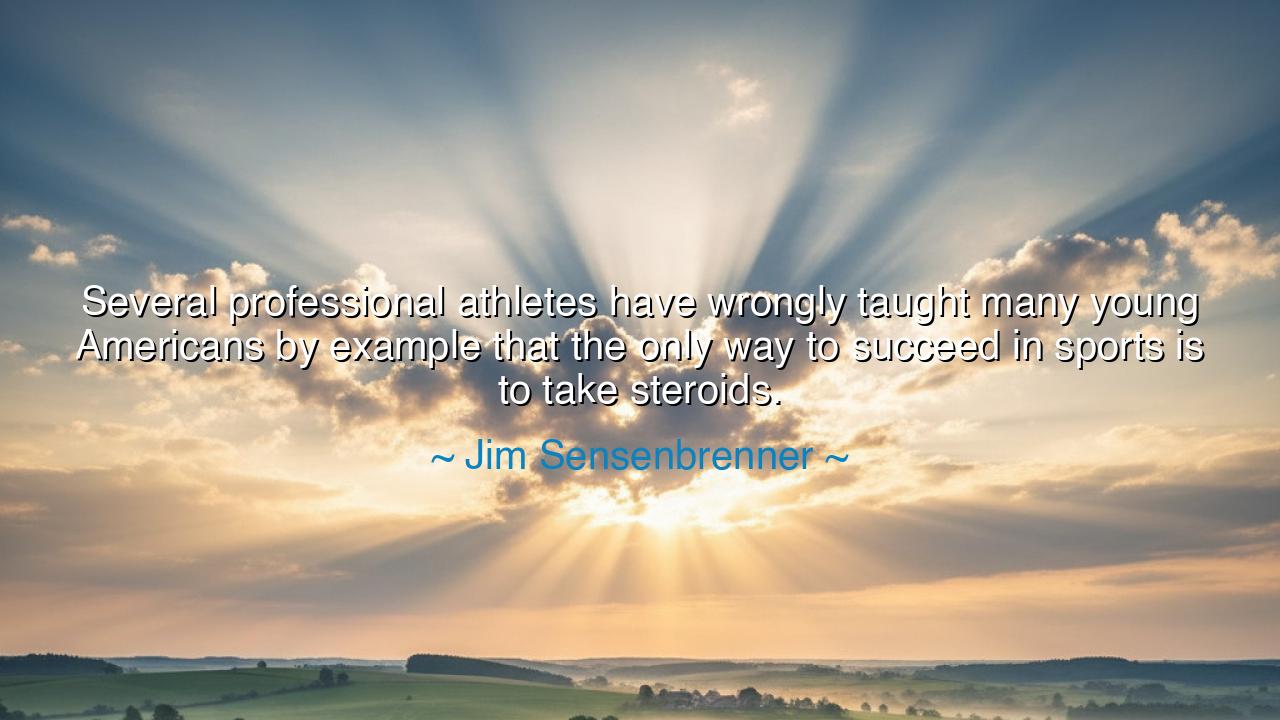
Several professional athletes have wrongly taught many young
Several professional athletes have wrongly taught many young Americans by example that the only way to succeed in sports is to take steroids.






Hear the solemn words of Jim Sensenbrenner, who warns with clarity and sorrow: “Several professional athletes have wrongly taught many young Americans by example that the only way to succeed in sports is to take steroids.” This is no idle complaint, but the lament of a society that has seen its heroes fall from the heights of glory into the shadows of deception. The words carry weight, for they are not only about the misuse of substances, but about the corruption of ideals, the betrayal of the young, and the loss of purity in pursuit of greatness.
At the heart of the quote is the image of the athlete, once a symbol of virtue, strength, and discipline, now tainted by the shortcuts of false power. In the ancient world, athletes were seen as near-sacred figures. At Olympia, they competed not for wealth but for honor, their wreath of olive leaves a crown bestowed by the gods themselves. To betray that calling with false strength would have been seen as an insult to the divine order. Thus, when Sensenbrenner speaks of modern athletes leading the youth astray, it is as though the guardians of virtue themselves have turned corrupters, transforming temples of inspiration into hollow facades.
The danger, he says, lies not only in the act of taking steroids, but in the message it sends. For the young, who look to their heroes as guides, learn not only from words but from examples. When they see champions rising through deceit, they are taught that discipline is useless, that hard work is insufficient, that greatness belongs only to those willing to sacrifice honor for advantage. This is the poison more dangerous than the drug itself: the belief that virtue cannot triumph without corruption.
Consider the tale of Ben Johnson, the Canadian sprinter who, in the 1988 Seoul Olympics, shattered records in the 100-meter dash—only for it to be revealed days later that his triumph was fueled by steroids. The world, once electrified by his speed, recoiled in betrayal. His medal was stripped, his name stained, and what should have been a moment of human achievement became a cautionary tale of dishonor. To this day, his story stands as a reminder that false strength crumbles under truth’s gaze, and that the pursuit of victory without integrity is no victory at all.
Yet the lesson of the quote is not one of despair, but of guidance. It reminds us that the true path to success—whether in sports, in art, or in life—is built not on shortcuts, but on endurance, discipline, and integrity. The strength gained through years of sweat, sacrifice, and self-control shines brighter and lasts longer than the fleeting, hollow triumph of deceit. The honest athlete, though perhaps slower to rise, inspires generations; the dishonest one wins only for a moment, and then becomes a warning carved into history.
Therefore, let us take from these words a call to vigilance. Let the elders guide the youth not only in skill but in virtue. Let coaches, teachers, and parents speak openly of integrity, reminding the young that strength of character outweighs strength of body. And let us as individuals hold our heroes to account, demanding not only their victories but their honor. For a society that excuses corruption in its champions will one day find corruption in its soul.
The practical action is this: whatever path you walk, resist the temptation of false shortcuts. Do not envy the one who seems to rise faster through deceit. Instead, cultivate the slow and steady fire of effort. Build your victories with your own hands, so that when you stand upon the podium—whether of sport, of work, or of life—you can look upon your crown without shame. Teach the young through example that honor is not a burden, but the very essence of greatness.
For in the end, the true champion is not the one who runs the fastest for a season, but the one whose life becomes a beacon, whose example strengthens others long after the body has faded. Such a champion needs no steroids, no false power, for their strength is eternal: the strength of integrity, the strength of truth.






AAdministratorAdministrator
Welcome, honored guests. Please leave a comment, we will respond soon